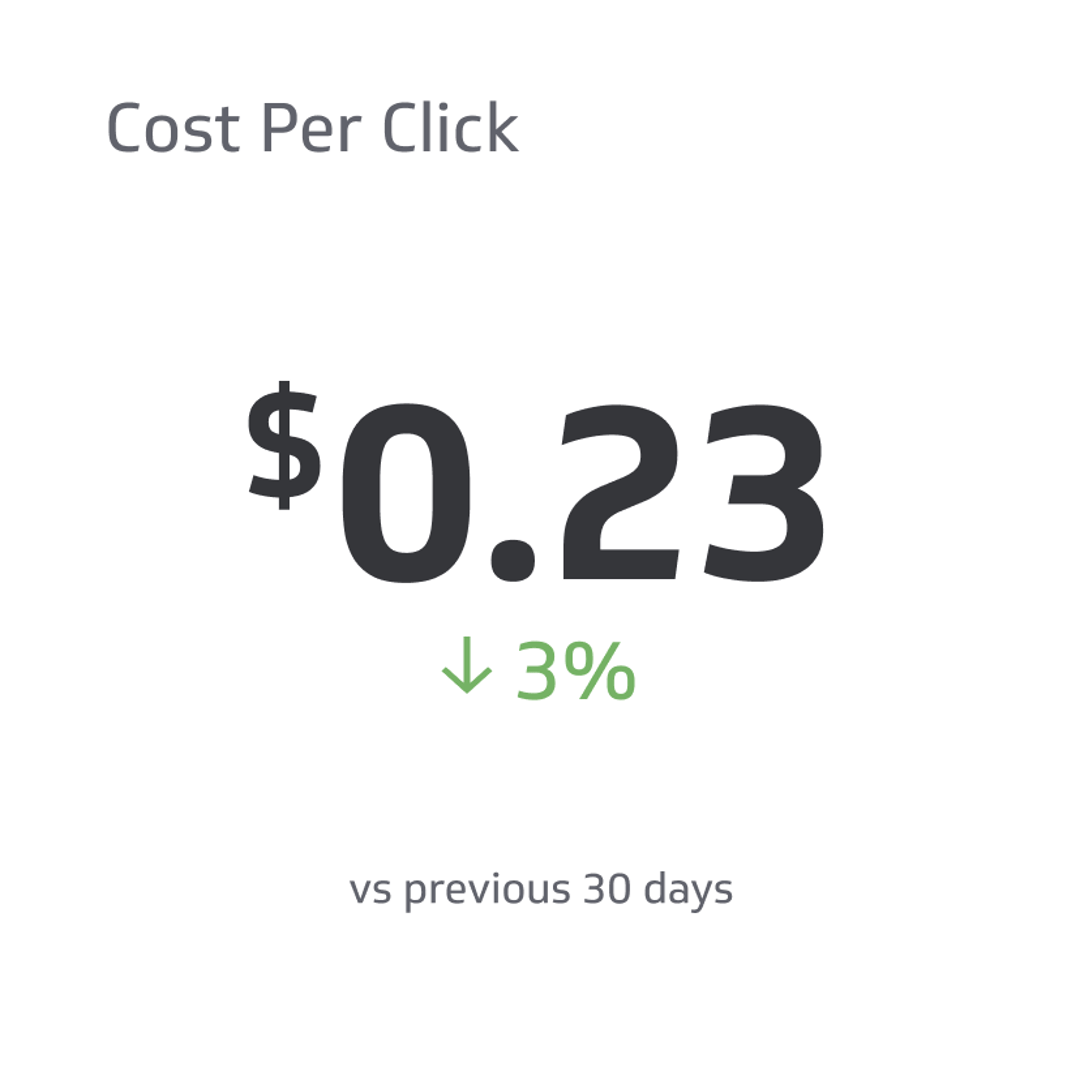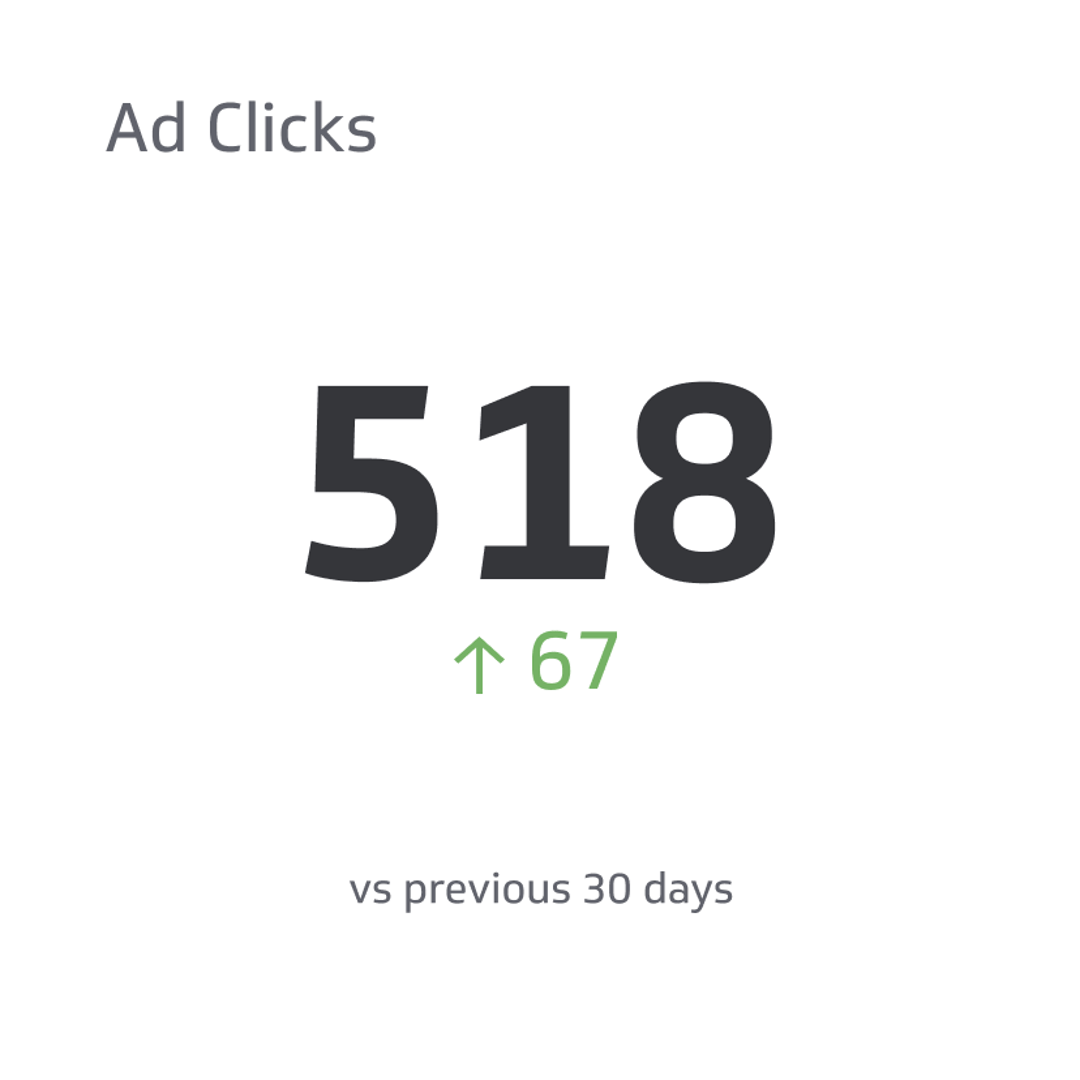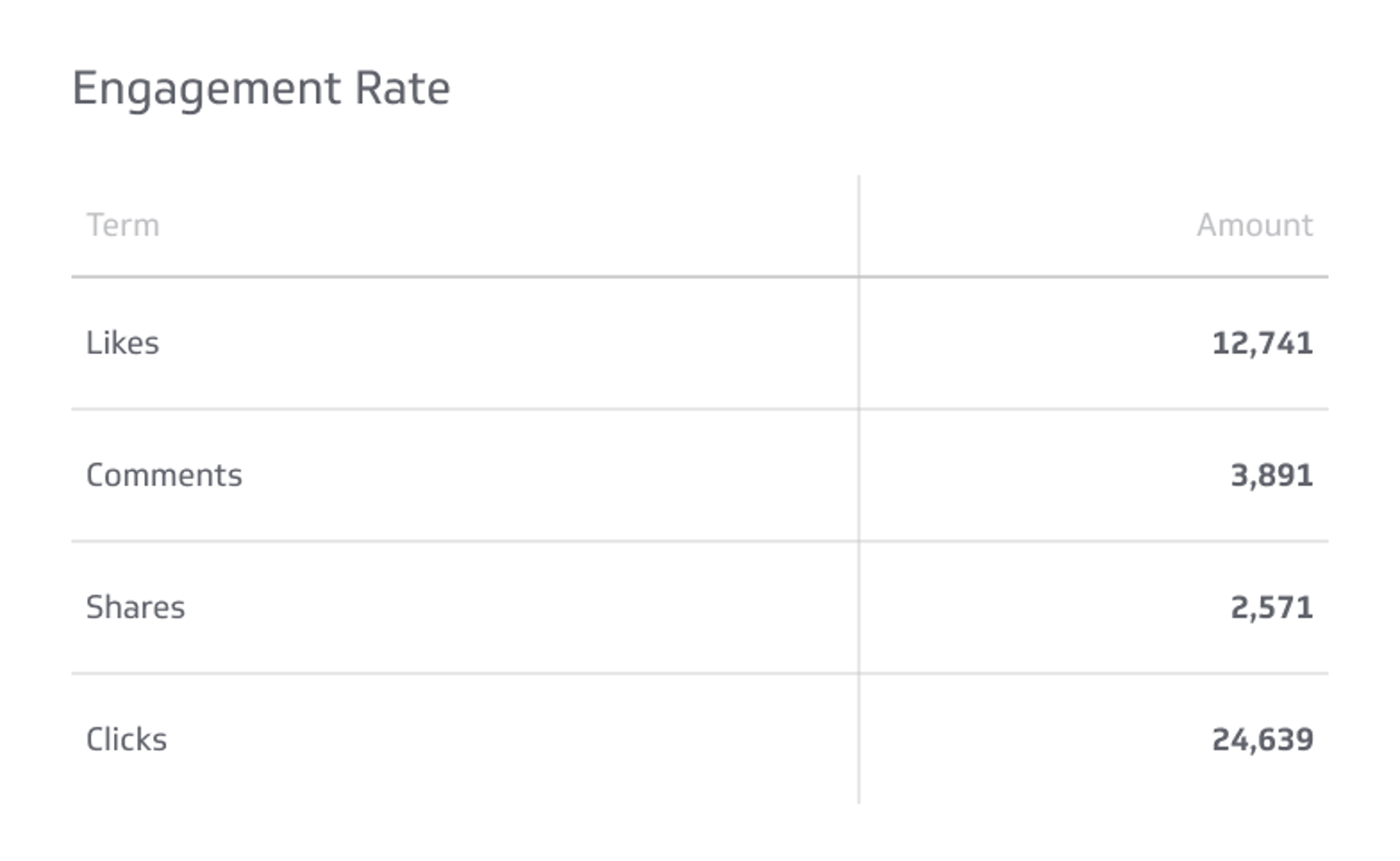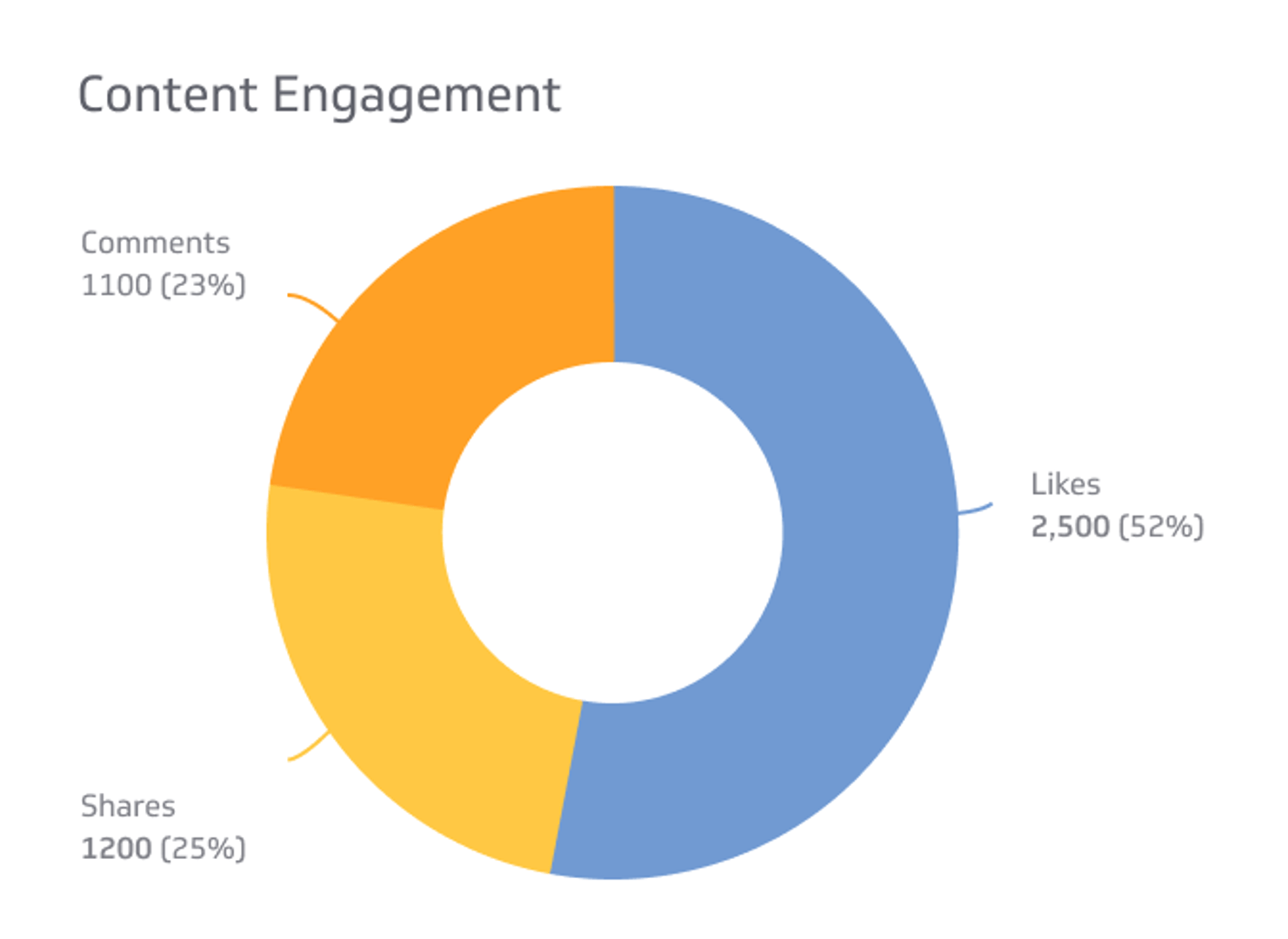Cost Per Click (CPC)
Cost per click, or CPC, is a critical metric in digital advertising that every marketer should be familiar with.
Track all your Digital Marketing KPIs in one place
Sign up for free and start making decisions for your business with confidence.

Cost per click, or CPC, is a critical metric in digital advertising that every marketer should be familiar with. This advertising model charges advertisers for every click their ads receive, regardless of whether the click leads to a conversion or not. Cost per click is an important digital marketing metric because it directly impacts the effectiveness and efficiency of digital marketing campaigns.
By closely monitoring your click cost, marketers can determine the return on investment of their campaigns and adjust their strategies accordingly. In the increasingly competitive world of online advertising, understanding CPC has become essential for businesses looking to maximize their returns from digital marketing investments.
What Is CPC (Cost per Click)?
Cost Per Click (CPC) is a digital ad metric that measures how much an advertiser pays each time someone clicks on their online ad. It is a common billing method in paid media platforms like Google Ads and Bing Ads.
This model offers a cost-effective approach to reaching potential customers as it only charges per click and not views.
This payment model empowers businesses to keep track of their ad expenses and yields a high return on investment since they only pay for a click that leads to conversions. There are a number of industries that use ads CPC, such as ecommerce websites like Amazon (or any business with an online store), healthcare providers, and insurance companies. App advertisers only rely on CPC to encourage people to immediately click download their mobile apps.
CPC advertising helps businesses of all types increase their online reach and drive traffic to their website or page, resulting in a greater chance of converting leads into sales.
Why Is Cost Per Click Important?
One of the most distinctive aspects of CPC advertising is that it is one of the most targeted and measurable forms of advertising available today. Unlike traditional marketing methods like print ads or TV commercials, CPC marketing allows advertisers to precisely find and target their ideal audience based on demographics, interests, and online behavior.
Since it's completely digital, CPC marketing will show real-time data on the effectiveness of each ad campaign, allowing advertisers to quickly adjust their approach and optimize their bid spending for maximum return on investment.
With CPC marketing, businesses can reach their target audience with unparalleled precision, ensuring that their ad costs are going toward the visitors most likely to convert into paying customers.
CPC advertising has emerged as one of the most effective modern methods for driving traffic and generating leads. Companies can now ensure that their ads are only shown to individuals who are likely to be interested in their products or services and only pay when they click on their ad, minimizing wasteful spending.
By combining precise targeting with cost-effectiveness, cost per click has become a go-to choice for businesses looking to maximize their digital marketing efforts.
How Do You Calculate CPC?
When it comes to online advertising, understanding how to calculate cost per click is crucial for assessing the success of your campaigns. To calculate CPC, you take your total ad cost divided by the number of clicks received.
This can be done by accessing your analytics dashboard or using an online tool like Google Ads. Then, you can divide the total cost used for each click on your ads.
It's all very straightforward, but some common mistakes can skew the results. For instance, not filtering out an irrelevant click from the ad data can overestimate the number of clicks received. Similarly, not accounting for the ad's impressions can underestimate the CPC rate, putting you way over budget.
To avoid these mistakes, you must define your target audience and match your ads to attract relevant clicks. Regularly monitoring and tweaking the campaign can also help clean the data and provide more accurate CPC results.
How Can CPC Ads Benefit Your Company?
One of the main advantages of CPC marketing is that it allows companies only to pay when a user clicks on their ad, resulting in more cost-effective advertising. Additionally, CPC marketing enables businesses to find and bid on specific audiences based on keywords and interests, ensuring their ads reach the right people at the right time.
By using cost per click effectively, companies can maximize their reach and improve their ROI. To make the most of cost per click, businesses should carefully research their target audience, monitor their ad performance, and continually refine their campaigns to improve click quality.
How To Maximize ROI With Click Campaigns
Running cost per click campaigns can be an effective way for businesses to capitalize on their return on investment, especially by targeting audiences outside their primary markets. Moreover, companies can maximize their return on ad spend by expanding their reach globally and focusing on regions with lower cost per click rates.
One way to achieve maximum CPC is by creating different ad sets tailored to specific regions and languages with the help of native speakers or translation services. It is also essential to conduct thorough research to determine each region's most effective ad platforms and channels, as this can vary significantly by country.
By implementing these strategies, businesses can unlock new markets and increase return on investment while optimizing their click campaigns.
Software Support
Investing in the right software to support CPC marketing efforts can make all the difference in the success of your ads. For example, the right software can help you track, read, and analyze data to understand the effectiveness of your ads and improve their quality.
Automation tools such as automatic bidding and ad scheduling can save time and optimize your campaigns. Choosing software that integrates with the ad platforms you already use saves you time and effort, allowing for seamless management of your ads.
Learning As You Go
To get the maximum possible return on your ad clicks, marketing experts need to keep up with the demands of the fast-paced digital market. To be able to bid efficiently and effectively, they need to familiarize themselves with the latest CPC marketing trends, tools like Google Ads, and their target audience's preferences and behavior.
Conducting extensive research, testing different ad formats, and analyzing performance metrics can also prove fruitful in improving CPC marketing tactics. Continuously refining your landing page, crafting compelling and relevant ad copy, and ensuring ad content aligns with your users’ personal intent can drive click success.
As the saying goes, practice makes perfect—regularly honing one’s CPC marketing skills paves the way to acquiring more clicks, engagement, and conversions.
Designing An Effective CPC Campaign
Running a successful CPC campaign is not just about throwing money at ads and hoping for the best. It requires a deliberate and strategic approach based on a clear understanding of the components of digital advertising.
Choosing your click target
The success of any CPC advertising campaign largely depends on choosing the right keyword or keywords. The right keyword strategy can potentially bring in the highest click through rate or CTR. A bid on the right keywords will help you reach your target audience and attract potential customers interested in your product or service.
One of the biggest mistakes a business can make when embarking on a CPC advertising campaign is choosing broad or competitive keywords. This results in less relevant traffic, lower conversion rates, and profits.
Moreover, you can conduct thorough keyword research using online search engine optimization (SEO) tools like Google Analytics. By understanding the intent of your target audience, you'll be able to find the best keywords for your campaign that get the right people to click on your ads.
Minding the Ad Copy
Additionally, the ad copy plays a crucial role in attracting and retaining potential customers and influencing their decision to click on your ad. Ad copy can not only make or break your click through rate and conversion rate, but it also affects the cost-per-click of your ads.
For example, the landing page, where the customer ultimately ends up after clicking on your ad, should be optimized for relevance and ease of use. The page must have a clear call-to-action guiding the user towards the desired action.
At its core, your ad copy should be concise, engaging, and tailored to the audience you are trying to reach. You can refine your ad copy with thorough research and testing to maximize its impact and improve your overall campaign performance. Crafting persuasive and compelling ad copy is crucial for any business looking to reap the benefits of a successful CPC campaign.
Keeping your eye on the campaign
Finally, monitoring and analyzing the ad campaign results regularly is critical in ensuring its ongoing success, allowing you to refine and readjust the campaign as needed to improve its performance. Even if the numbers aren't running in your favor, every click will show valuable information that can be used to strengthen your ad campaign.
Analyzing these results provides insights into what works or doesn't for your target audience. Without analyzing the results, it is impossible to determine which areas of your campaign require improvement. It will also be challenging to make informed decisions without accurate data.
In today's competitive business environment, every detail matters, and analyzing your ad campaign results will give you a significant advantage over your competitors. These components can help you build a successful CPC campaign that drives traffic, boosts conversions, and ultimately grows your business.
Looking Out For Potential Risks of a CPC Strategy
Despite its popularity in the ad industry, CPC marketing can be a tough nut to crack. One of the challenges that advertisers often face is stiff competition, which makes it harder to target a specific audience at a reasonable cost. Determining the right bidding strategy and setting an appropriate budget for your estimated costs can also prove challenging.
Another crucial challenge is creating quality ads that fully express the intent of the product or service the advertiser wants to promote. Despite these challenges, with the right strategy in place, CPC marketing can be a very effective way to reach a targeted audience.
Advertisers can overcome these challenges by regularly analyzing and optimizing their campaign data, identifying the most effective ad copy, and ensuring they target the right keywords. This allows marketers to create targeted, high-quality ads and consistently generate positive results.
Reach Your Target Audience With The Right CPC Campaigns
Cost-per-click (CPC) campaigns can be a powerful tool for businesses to reach potential customers and drive conversions. CPC models enable companies to pay the advertiser when a user clicks on their ad rather than paying for any arbitrary view or impression.
This strategy is highly effective in driving traffic to a website, provided the advertiser has a well-researched targeted audience and an analytical approach in place. Have the proper keyword research strategy in place so that whatever you’re investing is more than an equivalent to the actual price you pay for each click in your pay-per-click (PPC) marketing campaigns.
Overall, CPC advertising can be an excellent tool for businesses looking to increase their online presence and sales, but monitoring and adjusting campaigns to ensure maximum return on investment is essential. With careful planning and execution, integrating the cost-per-click business model into a broader marketing plan can effectively drive traffic to your company website and achieve your business objectives.
Related Metrics & KPIs



